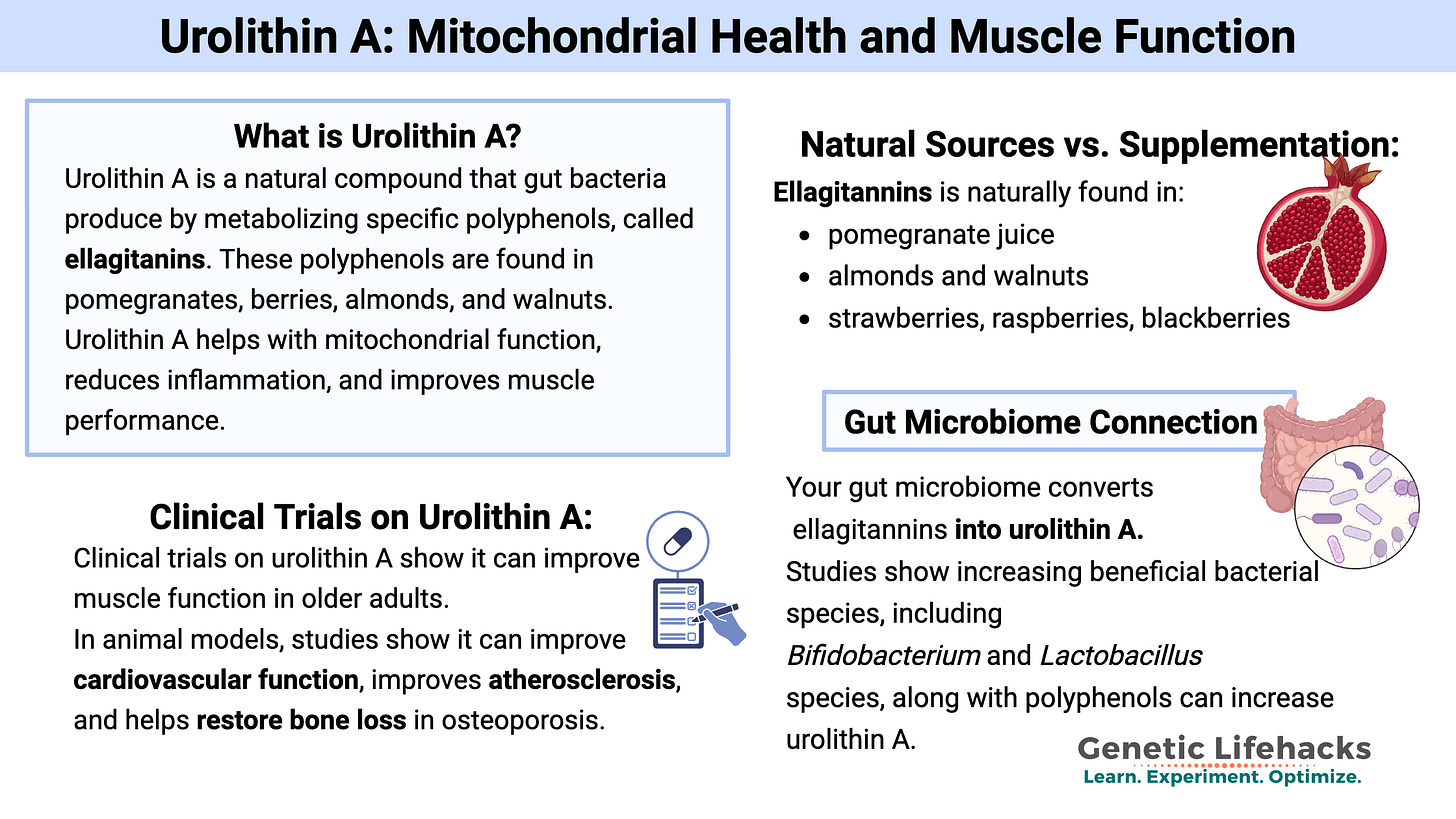Urolithin A & Mitochondrial Function
Hi everyone,
This week, I decided to dig into the research on urolithin A supplements to see if they live up to the hype.
What is urolithin A? It’s a metabolite produced by certain gut bacteria from the polyphenols found in pomegranate, berries, and walnuts. Research shows it supports mitochondrial health, muscle recovery, and reduces inflammation.
Here’s the catch: Most people don’t have enough of the right gut microbes to produce urolithin A naturally. That’s why supplements have become popular - however, a recent independent test revealed that urolithin A content varies dramatically between brands, with some containing almost none of the active compound.
In my new article, I explain the clinical trials and animal studies, what the supplement tests revealed, and a new study on how to promote your body’s own urolithin A production through microbiome changes.
Also updated this week:
Long Covid: There’s been a ton of new research that has come out on the cellular changes going on in people with long Covid, as well as several clinical trials on possible treatments. Full article on Long Covid
SLCO1B1, statins, and muscle pain: For anyone taking statins, check out your genes here.
Estrogen metabolism: research now shows that the same SLCO1B1 variant that impacts statins also interacts with menopausal HRT, estrogen metabolites, and breast cancer risk.
Stay curious,
~ Debbie
Urolithin A for Mitochondrial Health and Muscle Function
Key takeaways:
~ Urolithin A is a compound made in the gut microbiome that helps to renew and optimize mitochondrial function.
~ Made by specific gut microbes, only about 40% of the population has this antioxidant and anti-inflammatory compound in their body naturally these days.
~ Dietary precursors for urolithin A are found in many ‘heart-healthy’ foods such as pomegranates, blueberries, and walnuts.
~ Genetic variants may help you determine if you are more likely to need and benefit from urolithin A.
Member Story: Eureka Moments
Several years ago, I submitted my DNA to 23andMe. My initial interest was split between genealogy and the limited set of health traits 23andMe offered at the time.
A few years later, while browsing online, I came across the Genetic Lifehacks website. I decided to try the Top 5 Topics Consultation Report, which included a membership and cheat sheet for only $99. I figured, what did I have to lose?
When my report arrived, it actually included seven Top Topics to investigate. The information was interesting, but as someone new to DNA analysis, I didn’t fully understand how to connect the findings to my personal health, so I set it aside.
Around that same time, I was diagnosed with iritis, an inflammation of the iris. The condition was treated, but no underlying cause was identified. A couple of years later, I developed iritis again. This time, my doctors ordered more extensive bloodwork to search for a possible cause. One test revealed that I was HLA-B27 positive.
At first, I had no idea what that meant—until I remembered seeing “HLA-B27” in my DNA report from Genetic Lifehacks. I went back, reread the report, and that was the moment the light went on. The blood test confirmed what my DNA report had already shown two years earlier.
Encouraged by that experience, I decided to act on the number one topic in my report: Lipoprotein(a) and heart attack risk. Although my cholesterol had always been in the normal range, I asked my doctor to order a Lipoprotein(a) test. The results were shocking—almost three times the normal level. That finding reinforced my confidence in the accuracy and value of the DNA analysis you provided.
I shared my DNA report and blood test results with my family doctor, who was genuinely interested. I hope that as genetic insights like these become more accessible, they will play a greater role in mainstream medical practice.
What I’ve been reading:
A 3-month-long clinical trial involving 82 people with ME/CFS looked at 2,000 mg/day of oxalacetate vs. placebo. The oxalacetate group had greater improvement over time with fatigue and cognitive function.



